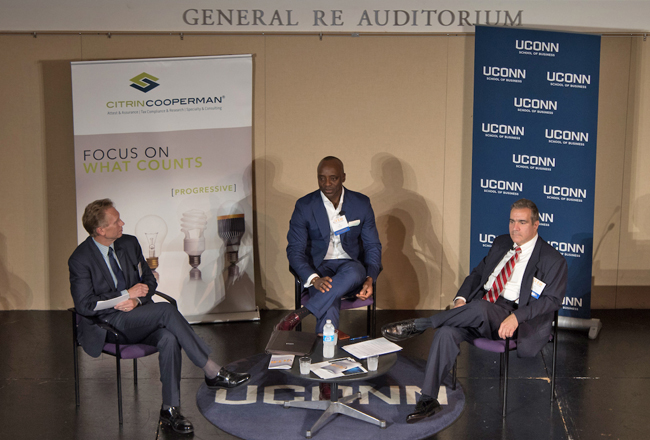‘CEO Evolution’ event trains eye on creating and sustaining business culture

Creating, maintaining and transforming a company”™s culture emerged as the main theme at the annual CEO Evolution, held June 14 in the GenRe Auditorium at the University of Connecticut School of Business in Stamford.
The program was presented by Citrin Cooperman, whose Connecticut Office Managing Partner Mark L. Fagan moderated; the UConn School of Business; and the Fairfield County Business Journal.
Following prefatory remarks by FCBJ Associate Publisher Anne Jordan Duffy, UConn School of Business Dean John A. Elliott, and Citrin Cooperman Manager Adam O”™Feeney, Fagan said that he wondered if business owners “know what they don”™t know” ”“ a key factor in future success, he said.
The point was underscored by panelist Oni Chukwu, president and CEO of etouches, a web-based event software management company whose U.S. headquarters is in Norwalk, and formerly executive vice president and chief financial officer of Triple Point Technology in Westport. He was a key figure in the sale of the latter to Dublin-based Ion Investment Group for approximately $900 million in cash in 2013.
“I learned a lot of things” from running the two firms, Chukwu said. “Patience ”“ you really need to take your time to talk through things. And you have to know the fundamentals ”“ have a business plan and know or learn how to run a business.
“But the number one thing you need to pay attention to is people,” he said. At all of the companies he”™s been with, “the number one common denominator was hiring the right people in the right situations. You have to spend time, effort and investment in the people.” From that base a company can create a sustainable culture, he said.
That led to what turned out to be the evening”™s focus, with the expected spotlight on artificial intelligence, its promise and potential pitfalls dimmed in favor of culture.
The evening”™s other panelist, John J. Preli ”“ director, regulatory management and data governance at The Weather Company/IBM Analytics ”“ took the reins to liken culture to the cultivation of a tree.
He said the roots represented the set of values the company sets for itself and its employees, the trunk and branches representing how those values are delivered ”“ “and they can be pruned if you want or need to change the culture,” Preli said) ”“ and the leaves, foliage and blossoms serving as the company”™s brand and public image. Such a cohesive ecosystem, he said, can be easily disturbed by failure in any one of those areas.
Preli noted that former IBM CEO Lou Gerstner had once remarked that he”™d always considered company culture to be part of the game, but near the end of his career he realized that “culture is the game.”
Both executives agreed that clear lines of communication must be maintained between upper management and rank-and-file employees, no matter the company”™s size. Chukwu said that etouches management makes regular visits to each of its offices around the globe and takes employees out for dinner.
“They”™re sitting across the table from the CEO, the CFO, and they can talk about anything,” he said. “Once you have an open bar the information flows very freely.”
Preli and Fagan said their organizations also strive to take employees”™ opinions seriously. IBM surveys its workers every six months, Preli said, “which is a great way to take (your company”™s) temperature.”
Fagan noted that “culture” is often a major consideration in the M&A field. “If we say we do something, we have to back it up with action,” he said.
He also noted that companies must be realistic. “If you ask the most successful companies to list all the things they”™ve done wrong, they”™ll fill pages,” he said. “If somebody”™s only able to list two or three things, that company has probably been treading water for two or three years.”
When the conversation shifted back to artificial intelligence and data, Chukwu said that “data is the new ”˜oil”™ of business ”“ it runs the digital economy.”
Small and medium-size businesses don”™t need to be afraid of technology and big data, Preli said. “You can start small.”
He emphasized that all businesses must stay abreast of technological developments, including in the areas of mobile ”“ in 2015, more cellphones were manufactured than there are people in the world, he said ”“ social media, and big data.
“How you leverage the information you”™re collecting will have a huge impact on your customers”™ experience,” Preli said.